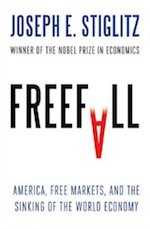Travel, at its best, changes the way we see the world. Join us each week as we dig into stories from people who took a trip—and came home transformed. Travel Tales by AFAR is your ticket to the world, no passport required. Find more inspiration at afar.com/traveltales.
…
continue reading
Innehåll tillhandahållet av The Center for International Studies at the University of Chicago. Allt poddinnehåll inklusive avsnitt, grafik och podcastbeskrivningar laddas upp och tillhandahålls direkt av The Center for International Studies at the University of Chicago eller deras podcastplattformspartner. Om du tror att någon använder ditt upphovsrättsskyddade verk utan din tillåtelse kan du följa processen som beskrivs här https://sv.player.fm/legal.
Player FM - Podcast-app
Gå offline med appen Player FM !
Gå offline med appen Player FM !
CHIASMOS: The University of Chicago International and Area Studies Multimedia Outreach Source [audio]
«
»
“Freefall: America, Free Markets, and the Sinking of the World Economy”
Manage episode 56755636 series 1501
Innehåll tillhandahållet av The Center for International Studies at the University of Chicago. Allt poddinnehåll inklusive avsnitt, grafik och podcastbeskrivningar laddas upp och tillhandahålls direkt av The Center for International Studies at the University of Chicago eller deras podcastplattformspartner. Om du tror att någon använder ditt upphovsrättsskyddade verk utan din tillåtelse kan du följa processen som beskrivs här https://sv.player.fm/legal.
 A talk by Columbia University professor Joseph Stiglitz. The current global financial crisis carries a "made in America" label. In "Freefall", Nobel laureate Joseph Stiglitz explains how America exported bad economics, bad policies, and bad behavior to the rest of the world, only to cobble together a haphazard and ineffective response when the markets finally seized up. Drawing on his academic expertise, his years spent shaping policy in the Clinton administration and at the World Bank, and his more recent role as head of a UN Commission charged with reforming the global financial system, Stiglitz then outlines a way forward building on ideas that he has championed his entire career: restoring the balance between markets and government; addressing the inequalities of the global financial system; and demanding more good ideas (and less ideology) from economists. "Freefall" combines an account of the current crisis with a discussion of the broader economic issues at stake. From the World Beyond the Headlines series.
A talk by Columbia University professor Joseph Stiglitz. The current global financial crisis carries a "made in America" label. In "Freefall", Nobel laureate Joseph Stiglitz explains how America exported bad economics, bad policies, and bad behavior to the rest of the world, only to cobble together a haphazard and ineffective response when the markets finally seized up. Drawing on his academic expertise, his years spent shaping policy in the Clinton administration and at the World Bank, and his more recent role as head of a UN Commission charged with reforming the global financial system, Stiglitz then outlines a way forward building on ideas that he has championed his entire career: restoring the balance between markets and government; addressing the inequalities of the global financial system; and demanding more good ideas (and less ideology) from economists. "Freefall" combines an account of the current crisis with a discussion of the broader economic issues at stake. From the World Beyond the Headlines series.261 episoder
Manage episode 56755636 series 1501
Innehåll tillhandahållet av The Center for International Studies at the University of Chicago. Allt poddinnehåll inklusive avsnitt, grafik och podcastbeskrivningar laddas upp och tillhandahålls direkt av The Center for International Studies at the University of Chicago eller deras podcastplattformspartner. Om du tror att någon använder ditt upphovsrättsskyddade verk utan din tillåtelse kan du följa processen som beskrivs här https://sv.player.fm/legal.
 A talk by Columbia University professor Joseph Stiglitz. The current global financial crisis carries a "made in America" label. In "Freefall", Nobel laureate Joseph Stiglitz explains how America exported bad economics, bad policies, and bad behavior to the rest of the world, only to cobble together a haphazard and ineffective response when the markets finally seized up. Drawing on his academic expertise, his years spent shaping policy in the Clinton administration and at the World Bank, and his more recent role as head of a UN Commission charged with reforming the global financial system, Stiglitz then outlines a way forward building on ideas that he has championed his entire career: restoring the balance between markets and government; addressing the inequalities of the global financial system; and demanding more good ideas (and less ideology) from economists. "Freefall" combines an account of the current crisis with a discussion of the broader economic issues at stake. From the World Beyond the Headlines series.
A talk by Columbia University professor Joseph Stiglitz. The current global financial crisis carries a "made in America" label. In "Freefall", Nobel laureate Joseph Stiglitz explains how America exported bad economics, bad policies, and bad behavior to the rest of the world, only to cobble together a haphazard and ineffective response when the markets finally seized up. Drawing on his academic expertise, his years spent shaping policy in the Clinton administration and at the World Bank, and his more recent role as head of a UN Commission charged with reforming the global financial system, Stiglitz then outlines a way forward building on ideas that he has championed his entire career: restoring the balance between markets and government; addressing the inequalities of the global financial system; and demanding more good ideas (and less ideology) from economists. "Freefall" combines an account of the current crisis with a discussion of the broader economic issues at stake. From the World Beyond the Headlines series.261 episoder
Toate episoadele
×Välkommen till Player FM
Player FM scannar webben för högkvalitativa podcasts för dig att njuta av nu direkt. Den är den bästa podcast-appen och den fungerar med Android, Iphone och webben. Bli medlem för att synka prenumerationer mellan enheter.




